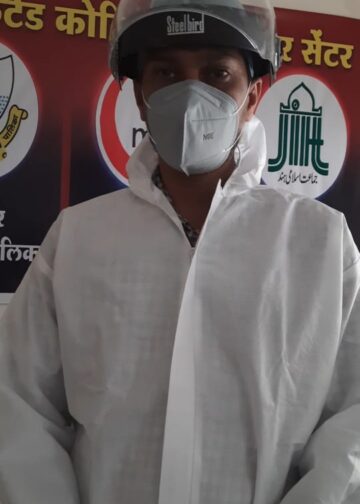NAGPUR, APR 27
Under the blistering sun, Dr. Anwar Siddiqui and his team set off from home to Jamaat-e-Islami Hind’s makeshift hospital at Nagpur. Observing fast, Dr. Anwar takes a round of the hospital and enquires about the health of the patients. Donning full PPE, the team braves 40 degree temperature to serve the people of this orange city.
Later in the afternoon, Dr. Anwar, who is Jamaat’s Nagpur unit president, leaves for Markaz to distribute oxygen cylinders among the needy patients.
Nagpur is the worst-hit district in Maharashtra. The entire system has collapsed and COVID has wreaked havoc. Every day 8000 new positive cases are reported in Nagpur.
On the roads of Nagpur, people are seen moving with their COVID reports. They are begging with folded hands for hospital beds. With a population of 30 lakh, Nagpur shares a 400-kilometer border with Madhya Pradesh and Chhattisgarh. Patients of two neighbouring states too come to Nagpur for treatment. This has put additional pressure on the medical infrastructure in the city. Once known as the medical hub of central India, Nagpur is becoming the COVID hotspot
Coming to the rescue of people is Jamaat e Islami Hind, which has set up 80 bedded hospital for COVID patients in collaboration with the Nagpur administration. It has brought major relief to the people who are battling death and disease.
Former Maharashtra Chief Minister Devendra Fadnavis also visited the Panchpaoli Covid Health Centre managed by the Jamaat and an NGO, Medical Service Society (MSS). He was accompanied by Nagpur Municipal Corporation(NMC) mayor Dayashankar Tiwari, NMC health officer Dr Sanjay Chilkar and other high ranking officials. Lauding the role of Jamaat-e-Islami, Nagpur and MSS, Fadnavis said, “Today our society needs such people and organisations who understand the pain and grief of people and who try to overcome their problems. We are glad to know that the Jamaat has come forward for this work and is trying to help out during this huge pandemic”. The Covid centre was inaugurated on April 1 by Nagpur city mayor.
Such is the condition in the city that people have lost count of the COVID patients. For the last three days, the administration has stopped RT-PCR tests in the district. The local administration said there is a huge patient inflow and they have no means to test everyone. Earlier, the administration was conducting 26000 RT-PCR tests per day. Such is the rush that test conducting machines are running out of steam.

Dr. Anwar said there is no oxygen, no test, no report, no ventilator, and no medicine available in Nagpur. “People have been left to die. Every day 50,000 to one lakh patients arrive here from neighbouring states. The administration has given up. Now Jamaat-e-Islami has stepped in to provide relief,” he said.
Jamaat hospital is being run in one of the buildings at Panchpoula. From treatment to sanitization to an oxygen supply, every facility has been made available here. Patients can be seen sitting on their beds inhaling oxygen and eating fruits. No patient has to rush for a doctor. Doctors visit them without any call.
Jamaat-e-Islami (Nagpur West) President Dr. Asif Khan said they had procured 100 oxygen cylinders last year when the first COVID wave hit India. “Those in need of oxygen take cylinders from here. Every day cylinders are refilled with oxygen and then distributed among the needy,” he said.
A patient in home isolation has to deposit Rs 5,000 as security for the oxygen cylinder. “Cylinders are being distributed irrespective of religion. We charge only Rs 500 from them. When they get the bed in any hospital, they hand over the cylinder. In other districts, people charge Rs 10,000 to 20,000,” he said.
Despite having one full year, the Centre failed to augment the medical infrastructure for Covid treatment in the country. Their attention was focused on bringing down the state governments. “If an organization can prepare a year ago, why can’t the government?” asked Dr. Khan.
Dr. Anwar said they can operate more hospitals if need arises. “However we need cooperation from the local administration. There are four to five buildings in Nagpur where beds can be set up. Jamaat can operate these facilities,” he said.
(Gurmehar Bhalla is Correspondent of indiatomorrow.net)












